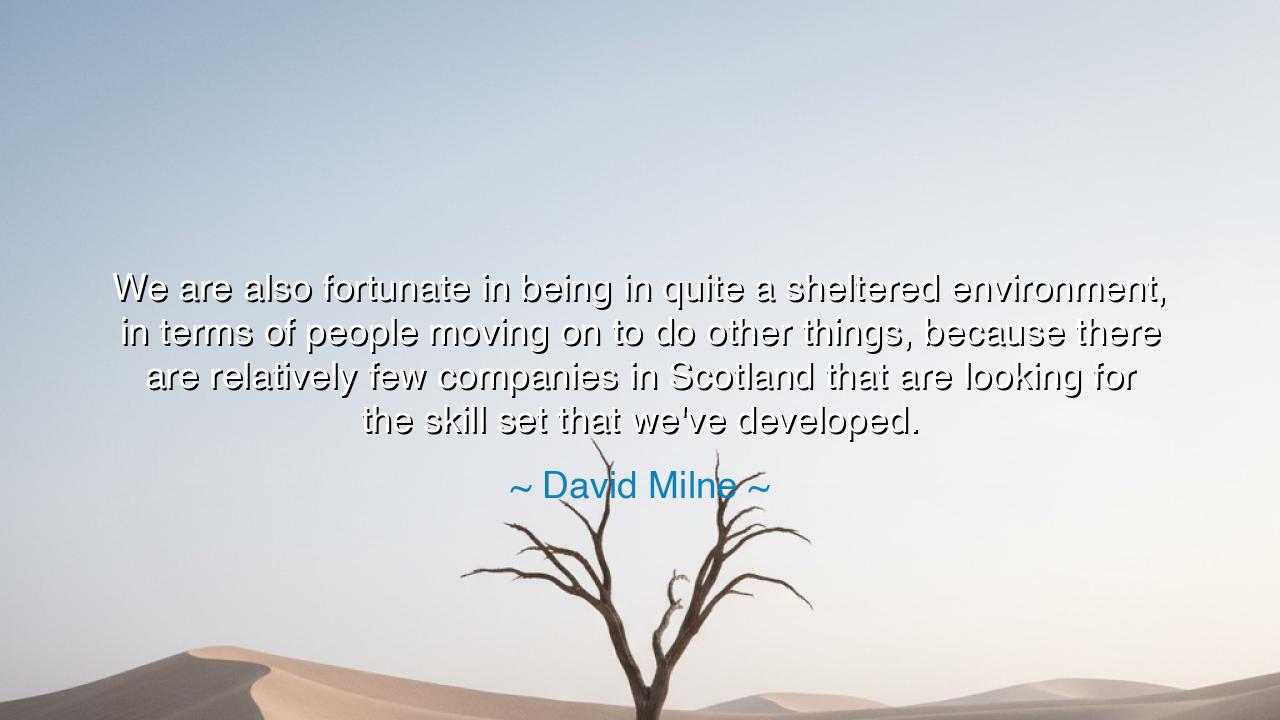
We are also fortunate in being in quite a sheltered environment
We are also fortunate in being in quite a sheltered environment, in terms of people moving on to do other things, because there are relatively few companies in Scotland that are looking for the skill set that we've developed.






In the words of David Milne we hear a reflection on labor, community, and the fragile balance between shelter and opportunity: “We are also fortunate in being in quite a sheltered environment, in terms of people moving on to do other things, because there are relatively few companies in Scotland that are looking for the skill set that we’ve developed.” His voice is not merely that of a businessman, but of one who has glimpsed the paradox of stability. For here he reveals that scarcity, which might first appear a weakness, can also become strength. Where there are few paths to lure workers away, loyalty and continuity are preserved.
This idea is ancient. The farmer whose land is surrounded by mountains may curse the barriers that keep him hemmed in, but he is also protected from the storms and raiders that devastate the valleys beyond. In the same way, Milne sees that the narrowness of opportunity in Scotland for certain rare skills creates a form of protection: a company’s people are less likely to scatter, less likely to be drawn into other pursuits. What might seem like limitation becomes a shield, a sheltered environment in which growth can take place with fewer interruptions.
Yet within this truth lies a tension. For history shows us that too much shelter can weaken, just as too much exposure can scatter. Consider the tale of Sparta and Athens. Sparta’s society was narrow, confined, disciplined; its people were trained only for war, and so their cohesion endured for centuries. Athens, by contrast, opened itself to trade, ideas, and arts, and in doing so created wonders of philosophy and democracy—but also faced the chaos of ambition and rivalry. Both cities paid a price, yet both reveal the ancient question: shall we prefer stability, or the vitality of change? Milne’s words echo this dilemma, as he names the fortune of shelter while acknowledging the limitation of a small market for their skill set.
There is wisdom also in seeing how movement of people shapes destiny. When the Israelites were captives in Babylon, they might have thought their skills wasted. Yet even there, their unity was preserved because they were strangers in a foreign land, their talents not widely sought. It was exile that bound them, and it was shelter in scarcity that allowed their identity to endure. Likewise, Milne observes that when talents are rare and demand limited, a company can cultivate its strength without losing its people too quickly to outside temptations.
But this truth must not be misread as a call to complacency. The wise leader knows that shelter is a gift, yet also a test. For within shelter, one must not grow idle, but must prepare for the day when the world changes. If new companies arise, if new demands emerge, will the people stand ready? Thus, the lesson here is twofold: cherish stability when it is given, but do not let it breed stagnation. Use the time of shelter to refine your craft, to deepen your culture, to strengthen your bonds, so that when the winds of change blow, you are not scattered like leaves, but rooted like oaks.
Practically, this means that in our own work, we should see scarcity not always as an enemy, but sometimes as a shield. If the world does not constantly pull at us with other offers, let us use that space to grow stronger where we are. If our environment shelters us, let us honor it by building a legacy of excellence, rather than seeking escape in restlessness. And if we are leaders, let us guide our people wisely, preparing them not only for the stability of today but for the opportunities of tomorrow.
So remember, children of tomorrow: shelter and scarcity are not always curses, but sometimes blessings in disguise. Stability can be the soil where loyalty grows, where craft is perfected, where communities endure. Yet one must always remain awake, vigilant, and prepared, for shelter does not last forever. Like Milne, let us see both the gift and the limitation, and let us turn both into strength for the journey ahead.






AAdministratorAdministrator
Welcome, honored guests. Please leave a comment, we will respond soon